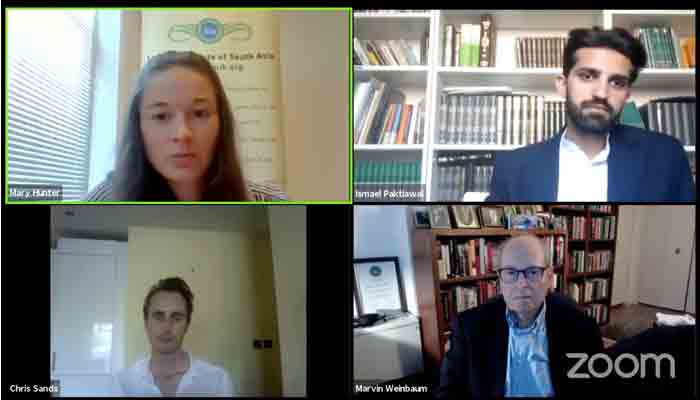Governance greatest test of Taliban, speakers say
LONDON: The biggest challenges facing Afghanistan under the Taliban rule are governance and performance delivery in the crisis-hit country, said the speakers while addressing “The Future of Afghanistan” Webinar, hosted by the London Institute of South Asia. (LISA) Researcher Mary Hunter moderated the event.
The keynote speakers included Dr Marvin Weinbaum, Director of Afghanistan and Pakistan Studies at the Middle East Institute; Major General (retd) Ijaz Awan, former High Commissioner of Pakistan to Brunei; Ismael Paktiawal, researcher and human rights advocate for Afghanistan; Umer Karim, visiting fellow at RUSI; and Chris Sands, former journalist in Afghanistan. Dr Marvin Weinbaum said that the UN Security Council adopted a resolution calling on the Taliban to allow safe passage to people out of the country, to allow humanitarian assistance and to protect human rights and the Taliban have indicated that they will comply. He emphasised that the Taliban has changed and is much more “sensitive to international opinion”.
He said indications based on this interim government suggest that “it is a government which will not bend over anything that the Taliban believes to be the “ demands of Sharia”. However, their greatest test lies in their governance and performance.
Ismael Paktiawal said that casualties in dozens from fighting were usual in Afghanistan but that has recently dropped to a “near zero”. He said the fighters in the North – Panjshir Valley - have attempted to resist the Taliban but they faced an enemy armed with sophisticated foreign military equipment and hardware. After so many years of non-stop conflict, he believed that people have lost the will to fight in Afghanistan .
Major General Ijaz Awan said a paper published by the NATO Defence College suggested that regional powers have to be diplomatically flexible in the Afghan Peace Process, but India had largely been inflexible towards the Taliban fearing they would terrorism against India. Awan said: “I think we all agree that regional countries have a responsibility for a lasting peace in Afghanistan. They all have stakes as well as sensitivities. But a peaceful and stable Afghanistan suits all of them.
It is better to be flexible than to make demands to Afghanistan, given the struggles the Afghans face.” The RUSI’s visiting fellow Umer Karim told the seminar: “If Afghanistan is stable, and becomes a connectivity hub then it benefits all of the regional actors. But the catch lies if geopolitics runs opposite to the geo-economics.
Pakistan is focusing on geo-economics while some of the neighbouring countries do not want to engage with Taliban.” Chris Sands spoke about the tech-savvy and cautious rhetoric of the Taliban and their attempt to present a soft side to the world.
-
 Prince William Warned His Future Reign Will Be Affected By Andrew Scandal
Prince William Warned His Future Reign Will Be Affected By Andrew Scandal -
 Amy Madigan Reflects On Husband Ed Harris' Support After Oscar Nomination
Amy Madigan Reflects On Husband Ed Harris' Support After Oscar Nomination -
 Is Studying Medicine Useless? Elon Musk’s Claim That AI Will Outperform Surgeons Sparks Debate
Is Studying Medicine Useless? Elon Musk’s Claim That AI Will Outperform Surgeons Sparks Debate -
 Margot Robbie Gushes Over 'Wuthering Heights' Director: 'I'd Follow Her Anywhere'
Margot Robbie Gushes Over 'Wuthering Heights' Director: 'I'd Follow Her Anywhere' -
 'The Muppet Show' Star Miss Piggy Gives Fans THIS Advice
'The Muppet Show' Star Miss Piggy Gives Fans THIS Advice -
 Sarah Ferguson Concerned For Princess Eugenie, Beatrice Amid Epstein Scandal
Sarah Ferguson Concerned For Princess Eugenie, Beatrice Amid Epstein Scandal -
 Uber Enters Seven New European Markets In Major Food-delivery Expansion
Uber Enters Seven New European Markets In Major Food-delivery Expansion -
 Hollywood Fights Back Against Super-realistic AI Video Tool
Hollywood Fights Back Against Super-realistic AI Video Tool -
 Pentagon Threatens To Cut Ties With Anthropic Over AI Safeguards Dispute
Pentagon Threatens To Cut Ties With Anthropic Over AI Safeguards Dispute -
 Meghan Markle's Father Shares Fresh Health Update
Meghan Markle's Father Shares Fresh Health Update -
 Samsung Galaxy Unpacked 2026: What To Expect On February 25
Samsung Galaxy Unpacked 2026: What To Expect On February 25 -
 Travis Kelce Takes Hilarious Jab At Taylor Swift In Valentine’s Day Post
Travis Kelce Takes Hilarious Jab At Taylor Swift In Valentine’s Day Post -
 NASA Confirms Arrival Of SpaceX Crew-12 Astronauts At The International Space Station
NASA Confirms Arrival Of SpaceX Crew-12 Astronauts At The International Space Station -
 Can AI Bully Humans? Bot Publicly Criticises Engineer After Code Rejection
Can AI Bully Humans? Bot Publicly Criticises Engineer After Code Rejection -
 Search For Savannah Guthrie’s Abducted Mom Enters Unthinkable Phase
Search For Savannah Guthrie’s Abducted Mom Enters Unthinkable Phase -
 Imagine Dragons Star, Dan Reynolds Recalls 'frustrating' Diagnosis
Imagine Dragons Star, Dan Reynolds Recalls 'frustrating' Diagnosis




